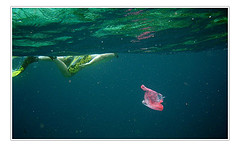
It may surprise you to learn that Daniel Burd does not consider himself an environmentalist. The Canadian teenager has become bit of an environmental hero over the past few days, as word of his potentially revolutionary science fair project has spread. In case you missed it, Burd managed to isolate the naturally occurring microbes that degrade plastic bags in landfills, cutting degradation time from lifetimes to mere months.
Maybe anyone could have done it, but no one else has. And that, says Burd, is part of what inspired him to pursue the project, which he started researching at the end of 2006. “As I began to research more and more, I found out we’re not doing too much,” he told me in a phone call from his home in Ontario. He is, in his words, “just a scientist trying to solve a huge problem.”
“In the end, all problems come back to us,” he says. “The plastic bags in the water, they don’t dissolve, and they attract hydrophobic chemicals. Fish or other organisms may eat polluted plastic bags, and then we have millions of marine animals dying. If they don’t die, then we may eat these fish, and then we have a statistical increase in healthcare problems directly attributable to that pollution. That’s why everybody should be concerned.”
“I would hope that through my project I’m able to, first of all, show a viable solution, economical and doable, and then get people more aware of it,” he says. “Then we can fix it.”
I wasn’t the first person to call Burd—far from it. Since news of his project broke, he says that his high school and the local newspaper have been fielding constant calls from journalists, scientists, and “concerned citizens,” all interested in what he’s going to do to make his discovery viable on an industrial scale. A scientist since he first planted a tomato seed to see if it would grow, Burd says he’s completely dedicated to pursuing the project and improving his method using some of his scholarship and prize money. For now, however, he’ll have to balance his continuing work with other obligations. Like, um, high school.
Photo used under a Creative Commons license from Flickr user betoinorge.
—Casey Miner


